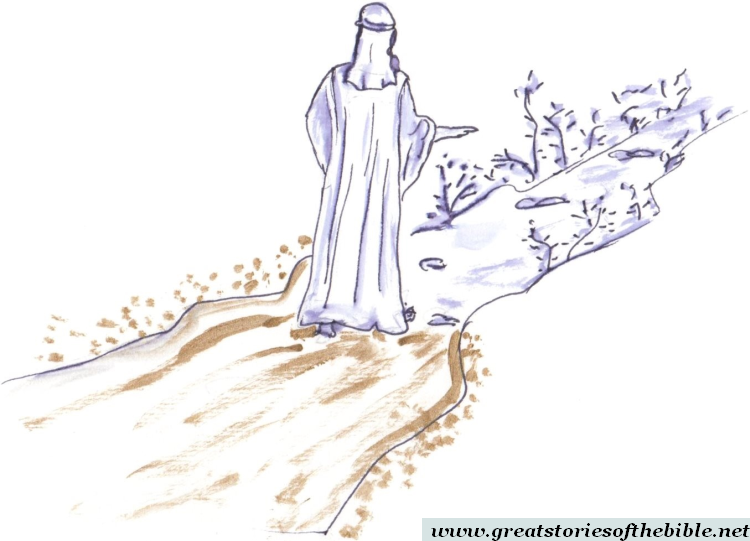Malachi (“my messenger”)
I will send you Elijah the prophet
Malachi concludes the Book of the Twelve Prophets and, in the Catholic Bible, the entire Old Testament. He probably operates after Haggai and Zechariah (520 BC) and before Nehemiah’s reform (445 BC: see Neh 2,1) that prohibits the marriage with a foreign partner to the people returned from the Babylonian exile. Malachi protests against the sins that the priest do in the worship practices, against the marriages with foreign women and the divorces. «“A son honors his father, and a servant his master. If I am a father, then where is my honor? And if I am a master, where is the respect due me? Says the LORD of hosts to you, priests, who despise my name. You say, ‘How have we despised your name?’ You offer polluted bread on my altar. You say, ‘How have we polluted you?’ In that you say, ‘The LORD’s table contemptible.’ When you offer the blind for sacrifice, isn’t that evil? And when you offer the lame and sick, isn’t that evil? Present it now to your governor! Will he be pleased with you? Or will he accept your person?” says the LORD of hosts» (Mal 1,6-8). «Do we not all have one father? Hasn’t one God created us? Why do we deal treacherously every man against his brother, profaning the covenant of our fathers? Judah has dealt treacherously, and an abomination is committed in Israel and in Jerusalem; for Judah has profaned the holiness of the LORD which he loves, and has married the daughter of a foreign god. The LORD will cut off, to the man who does this, him who wakes and him who answers, out of the tents of Jacob, and him who offers an offering to the LORD of hosts. This again you do: you cover the altar of the LORD with tears, with weeping, and with sighing, because he doesn’t regard the offering any more, neither receives it with good will at your hand. Yet you say, ‘Why?’ Because the LORD has been witness between you and the wife of your youth, against whom you have dealt treacherously, though she is your companion, and the wife of your covenant. Did he not make one, although he had the residue of the Spirit? Why one? He sought a godly seed. Therefore take heed to your spirit, and let none deal treacherously against the wife of his youth. For I hate divorce,” says the LORD, the God of Israel, “and him who covers his garment with violence!” says the LORD of hosts. “Therefore take heed to your spirit, that you do not deal treacherously» (Mal 2,10-16).
The “Lord’s day” will come against evil and to reestablish justice, preceded by a «messenger», «Elijah the prophet»: «“Behold, I send my messenger, and he will prepare the way before me; and the Lord, whom you seek, will suddenly come to his temple; and the messenger of the covenant, whom you desire, behold, he comes!” says the LORD of hosts.
“But who can endure the day of his coming? And who will stand when he appears? For he is like a refiner’s fire, and like launderer’s soap; and he will sit as a refiner and purifier of silver, and he will purify the sons of Levi, and refine them as gold and silver; and they shall offer to the LORD offerings in righteousness. […] For, behold, the day comes, it burns as a furnace; and all the proud, and all who work wickedness, will be stubble; and the day that comes will burn them up,” says the LORD of hosts, “that it shall leave them neither root nor branch. But to you who fear my name shall the sun of righteousness arise with healing in its wings. You will go out, and leap like calves of the stall. You shall tread down the wicked; for they will be ashes under the soles of your feet in the day that I make,” says the LORD of hosts. “Remember the Law of Moses my servant, which I commanded to him in Horeb for all Israel, even statutes and ordinances. Behold, I will send you Elijah the prophet before the great and terrible day of the LORD comes. He will turn the hearts of the fathers to the children, and the hearts of the children to their fathers, lest I come and strike the earth with a curse» (Mal 3,1-3.19-24). According to the Gospel those verses describe Jesus’ coming, while Elijah preparing the way is John the Baptist (Matt 11,10-15; Matt 17,10-13; Mark 9,9-13; Luke 1,17).
After Malachi we find the gospels. The Old Testament book order gives us an idea of its interpretation by the reader: the Catholic Bible modified the Hebrew book order (Tȏrāh [Pentateuch], Prophets [including some of the Historical Books], Writings [approximately the Books of Wisdom and the Poetic Books]) putting the Prophets at the end. In facts, in the Christians’ opinion, they foretold Jesus’ coming: He definitively fulfills their prophecies (see all the Christological interpretations we wrote in the previous posts). The Prophets are the perfect “introduction” to the New Testament: Malachi ends announcing Elijah’s return; Jesus’s mission starts after he receives the baptism by John, the «Elijah, who is to come» (Matt 11,14).